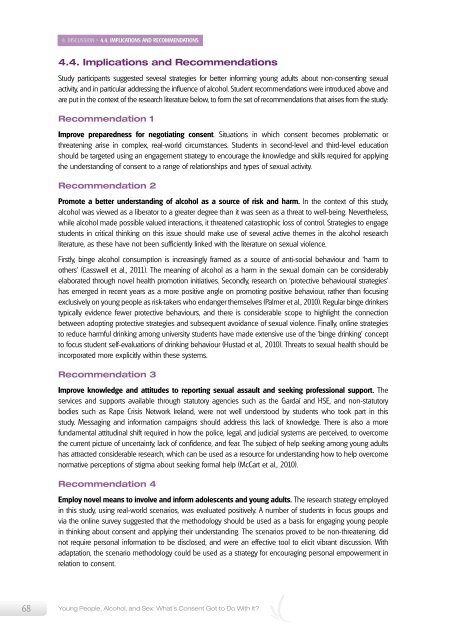Whats-Consent-Full-A41
Whats-Consent-Full-A41
Whats-Consent-Full-A41
Create successful ePaper yourself
Turn your PDF publications into a flip-book with our unique Google optimized e-Paper software.
4. Discussion > 4.4. Implications and Recommendations4.4. Implications and RecommendationsStudy participants suggested several strategies for better informing young adults about non-consenting sexualactivity, and in particular addressing the influence of alcohol. Student recommendations were introduced above andare put in the context of the research literature below, to form the set of recommendations that arises from the study:Recommendation 1Improve preparedness for negotiating consent. Situations in which consent becomes problematic orthreatening arise in complex, real-world circumstances. Students in second-level and third-level educationshould be targeted using an engagement strategy to encourage the knowledge and skills required for applyingthe understanding of consent to a range of relationships and types of sexual activity.Recommendation 2Promote a better understanding of alcohol as a source of risk and harm. In the context of this study,alcohol was viewed as a liberator to a greater degree than it was seen as a threat to well-being. Nevertheless,while alcohol made possible valued interactions, it threatened catastrophic loss of control. Strategies to engagestudents in critical thinking on this issue should make use of several active themes in the alcohol researchliterature, as these have not been sufficiently linked with the literature on sexual violence.Firstly, binge alcohol consumption is increasingly framed as a source of anti-social behaviour and ‘harm toothers’ (Casswell et al., 2011). The meaning of alcohol as a harm in the sexual domain can be considerablyelaborated through novel health promotion initiatives. Secondly, research on ‘protective behavioural strategies’has emerged in recent years as a more positive angle on promoting positive behaviour, rather than focusingexclusively on young people as risk-takers who endanger themselves (Palmer et al., 2010). Regular binge drinkerstypically evidence fewer protective behaviours, and there is considerable scope to highlight the connectionbetween adopting protective strategies and subsequent avoidance of sexual violence. Finally, online strategiesto reduce harmful drinking among university students have made extensive use of the ‘binge drinking’ conceptto focus student self-evaluations of drinking behaviour (Hustad et al., 2010). Threats to sexual health should beincorporated more explicitly within these systems.Recommendation 3Improve knowledge and attitudes to reporting sexual assault and seeking professional support. Theservices and supports available through statutory agencies such as the Gardaí and HSE, and non-statutorybodies such as Rape Crisis Network Ireland, were not well understood by students who took part in thisstudy. Messaging and information campaigns should address this lack of knowledge. There is also a morefundamental attitudinal shift required in how the police, legal, and judicial systems are perceived, to overcomethe current picture of uncertainty, lack of confidence, and fear. The subject of help seeking among young adultshas attracted considerable research, which can be used as a resource for understanding how to help overcomenormative perceptions of stigma about seeking formal help (McCart et al., 2010).Recommendation 4Employ novel means to involve and inform adolescents and young adults. The research strategy employedin this study, using real-world scenarios, was evaluated positively. A number of students in focus groups andvia the online survey suggested that the methodology should be used as a basis for engaging young peoplein thinking about consent and applying their understanding. The scenarios proved to be non-threatening, didnot require personal information to be disclosed, and were an effective tool to elicit vibrant discussion. Withadaptation, the scenario methodology could be used as a strategy for encouraging personal empowerment inrelation to consent.68 Young People, Alcohol, and Sex: What’s <strong>Consent</strong> Got to Do With It?


